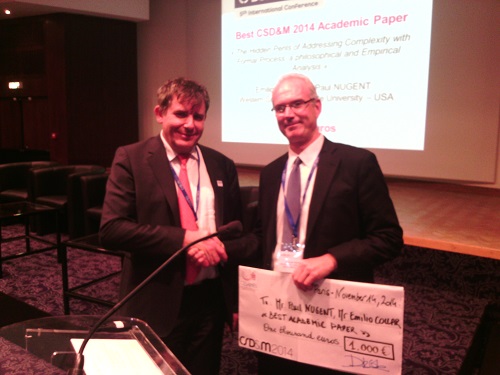
Western Connecticut State University faculty members Dr. Paul Nugent and Dr. Emilio Collar have been honored as recipients of the 2014 Best Academic Paper Award recently presented at the Fifth International Conference on Complex Systems Design and Management (CSD&M) in Paris, France.
Nugent and Collar are co-authors of the paper, “The Hidden Perils of Addressing Complexity with Formal Process: A Philosophical and Empirical Analysis,” submitted to the CSD&M conference sponsored by the Paris-based Center of Excellence on Systems Architecture, Management, Economy and Strategy. Nugent traveled to France in November to present the paper and accept the award, which carried a prize stipend of 1,000 euros, from conference chairman Daniel Krob.
Nugent, an associate professor of management information systems (MIS) at Western, served as principal investigator for the research paper. Collar, who serves as assistant dean of the Ancell School of Business and an associate professor of MIS, provided support in reviewing the professional literature that set the scholarly foundations for research inquiry.
In framing his research questions, Nugent drew extensively from his professional experience as a lead systems engineer and lead information assurance engineer at General Dynamics, focusing on the implementation since the mid-1990s of a process for quality control known as Capability Maturity Model Integration (CMMI). Departing from the heavily quantitative and data-driven approach that most engineers take in research studies, Nugent’s paper provided a qualitative analysis of what interviews conducted with engineers during and after the introduction of CMMI suggested about the human dimensions of formalizing processes for quality control.
“As an engineer and a sociologist, I am interested in how new technologies are being used in the workplace,” he remarked. He noted that the paper approached the introduction of CMMI “from the human side, getting beneath the surface to a deeper level of analysis that you cannot achieve simply through surveys or managers’ observations. This study looks at the implementation of a formal process in a business organization, and the consequences for the engineers and their work when the social consequences of that process are not understood.”
The paper’s comparison of employee interviews about CMMI at the start of its implementation, and again five years into its implementation, found that formalization of the quality control process in an organization tended to discourage engineers from venturing beyond their defined job roles and working collaboratively to tackle product design issues. At the same time, the study revealed a shift in the perceived responsibility for product quality from the individual worker to the CMMI process itself, and engineers’ personal commitment was further eroded by reassignments from one role to another. “Through time, this transformed the culture to one of less commitment to organizational outcomes and less identification with one’s product for success or failure,” the paper said.
Collar observed that Nugent’s qualitative approach to systems engineering research set the paper apart in submissions for the CSD&M conference. Engineers more typically “look at the function of the people affected by new technology and processes almost as if they were machines,” Collar said. “They fail to consider how people are influenced and impacted by the technology.”
Nugent said that he sought in his remarks at the award presentation to address the human impact of technological innovation. “The paper’s findings are a caution to those who are implementing new technologies, to bear in mind that it’s sometimes not as simple as they think,” he said. “It provides a reminder that they are making assumptions about how people behave and react to the introduction of new technologies that may not be valid, and that sometimes they need to step back and consider more carefully the negative consequences that may result.”
For more information, contact the Office of University Relations at (203) 837-8486.
Western Connecticut State University offers outstanding faculty in a range of quality academic programs. Our diverse university community provides students an enriching and supportive environment that takes advantage of the unique cultural offerings of Western Connecticut and New York.
Our vision: To be an affordable public university with the characteristics of New England’s best small private universities.